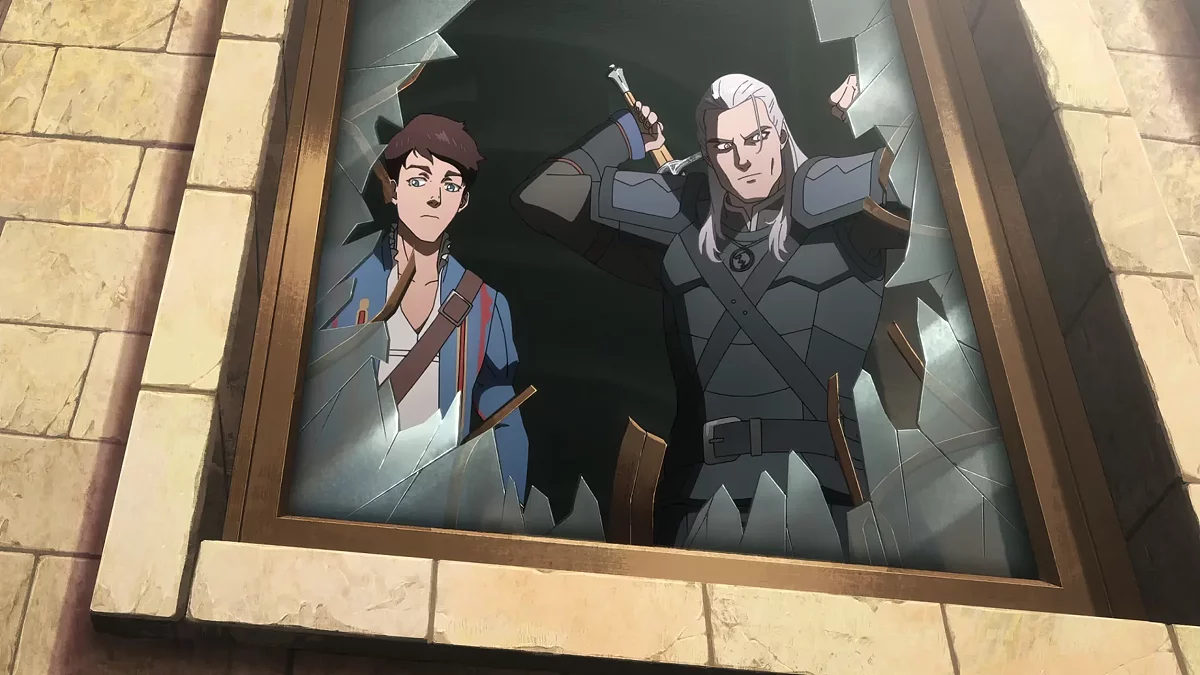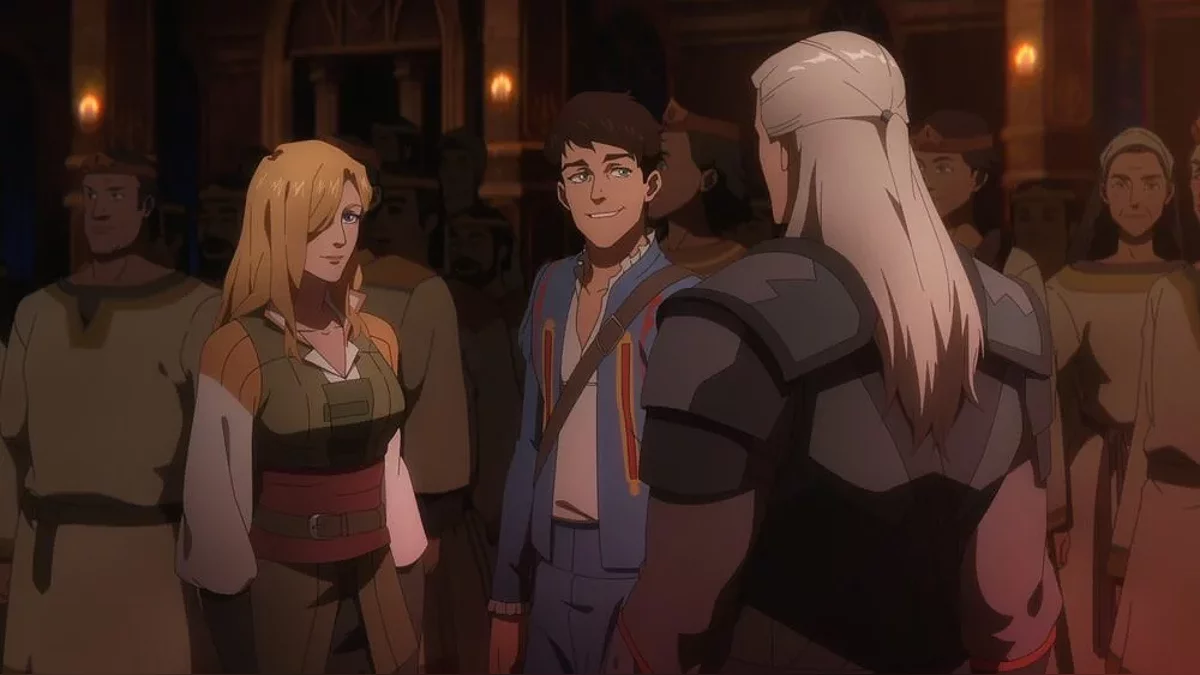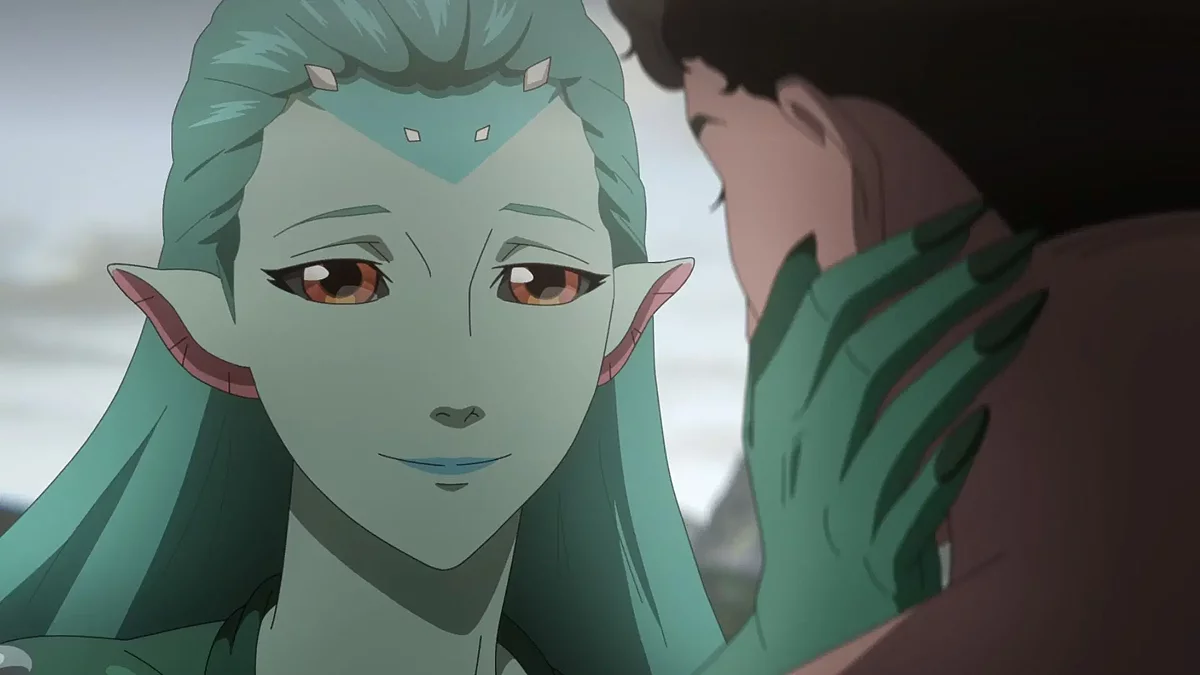
The Witcher: Sirens of the Deep Review. Forbidden for fans of Andrzej Sapkowski's books
 Dmitry Pytakhin
Dmitry Pytakhin
The Witcher: Sirens of the Deep is a new Netflix animated film about the white-haired monster slayer, Geralt. This feature-length film is based on the standalone short story A Little Sacrifice and chronologically takes place before everything that happened with Ciri, but after Geralt's introduction to Yennefer. It's the same Witcher, without aspirations for a grand epic, and seems to be the best way to remind fans of the project. We've watched the film, and its depth turned out to be significantly less than we would have liked. No matter how hard Netflix tries, the spirit of Slavic folklore remains elusive for the American company, but let's go through everything in order.
Since Netflix acquired the rights to adapt the Witcher novels, the White Wolf has had a tough time. The series' strange casting, numerous inconsistencies with the source material, which the creators not only aren't ashamed of but continually add to, the agenda, and finally, the departure of the lead actor from the main role. Standing apart from all this chaos were projects aimed at, let's say, expanding the universe. The animated film The Witcher: Nightmare of the Wolf shook up Vesemir's youth, while the prequel The Witcher: Blood Origin is not something polite society mentions today. Against the backdrop of such negative growth and success, the announcement of a new animated film was met with a chilly reception. However, this situation seemed more promising. A Little Sacrifice is a short story, a vignette from Geralt's life, which is also based on the fairy tale of The Little Mermaid. There's no need to invent anything—just adapt it step by step.
The animated film was decided to be made in the same style as The Witcher: Nightmare of the Wolf, meaning anime-like. It took a long time to draw, and they invited the official voice of Geralt from the video game to voice the white-haired character. It seemed like nothing could go wrong.
And indeed, the first impressions are more than positive. The Witcher strongly resembles the younger version from The Witcher 3: Wild Hunt, although the voice doesn't quite fit him, but that's a minor issue. Dandelion, on the other hand, is from the series but not as inept. The first fight is beautiful, though a bit drawn-out, and the story seems very similar to the original... The key word is "seems." We took the time to reread the story. Immediately after that, the animated film stopped being perceived as positively.
For some reason, the creators seem to consider the target audience to be extremely naive, and thus decided that viewers wouldn't understand the reference to The Little Mermaid as it is already presented in the story. Without much thought, the scriptwriters changed a few moments, or rather almost everything. Instead of an unpleasant prince who hires the witcher as a translator for the siren's language, doesn't pay when the mermaid refuses to marry him, and nearly starts a war with the sea folk over pearls, we now have three characters.
The first is the head of the family, an elderly prince who is as unpleasant as in the original but has nothing to do with the siren. The second is his son, a Gen Z boy who just wants to make love to the mermaid (don't ask how exactly), or even better, marry her. The boy doesn't accept his father's objections, which are sometimes quite justified, and generally has little understanding of the events happening around him. As befits a Gen Z, he is full of complaints and a love of freedom, but lacks any responsibility.
Finally, the third character is the prince's adopted son, who is also his commander. In the story, there was a character with the same name who appeared for a couple of paragraphs and played no role at all. Now, he is one of the central figures, who also has a personal conflict with Dandelion. The bard suddenly turns out to be from these parts. In his childhood, everyone bullied and teased him, only a brave girl friend, the future poetess Eye, wasn't afraid to stand up to the gang of hooligan boys. Netflix, what's wrong with you?
Eye herself is also in the animated film, but she too has been changed. In the original, the girl was an extremely complex and contradictory character who followed the voice of reason until the end but ultimately gave in to sudden feelings for the witcher. Geralt initially considered her a mere amusement, but soon realized his mistake and tried not to give the poetess false hopes. This was largely thanks to Dandelion's advice. The story accurately conveys the witcher's internal emotions, who remembers Yennefer and understands that he could have taken advantage of Eye, comforted her with a quiet, gentle act of love, and been a little sacrificial, but he felt nothing for her.
In the animated film, Eye is strong and independent. She decides when and with whom to sleep. Until the end, she and Geralt don't even have much chemistry, but in the end, they have the very sex that never happened in the original. And if in the story, Eye helplessly cried, confessing her feelings to the witcher, feeling weak and vulnerable, in Netflix's creation, the poetess herself lets the witcher go after their union, as she needs a family, and the foolish brute is incapable of that. Do you feel the difference in the emotional background?
In some places, the scriptwriters try to quote the original, but it comes off as awkward and inappropriate. For example, the line about Geralt and Eye barely knowing each other, which was the cause of several conflicts and dialogues, is mentioned in passing in the series and doesn't really lead to anything.
Geralt and Dandelion themselves have also changed. We've mentioned many times in our reviews of the series that Netflix's bard turned out to be just terrible. Dandelion is more or less fine and managed to deliver a memorable hit about tossing a coin, but his relationship with Geralt is a total nightmare. In the books, Dandelion always stood as an equal with the witcher. Yes, he's not a fighter, but he's a respected and proud musician who never allowed anyone to walk over him. He always found something to say or advise to Geralt, who invariably listened. His characteristic foolishness was, of course, present, but behind it stood a wise and sensitive person. In the series, nothing remains except for the foolishness. Moreover, Geralt never perceived Dandelion as an annoying burden. They are friends, and thus in the books, there is no dissonance when the bard gives advice to Geralt or argues with him.
For some reason, Netflix decided that a situation where a strong witcher normally interacts with a skinny bard is impossible, so Dandelion has to be the eternal punching bag and subject to constant rebukes from the White Wolf. If one doesn't know the original, watching the series makes it unclear why these two still interact. Just because it's written in the script?
The new animated film unexpectedly takes a step forward in this issue. Dandelion, believe it or not, is a normal character. Still not the ideal version from the book, but already much better. Geralt listens to him, the bard doesn't feel like a useless ballast and can even give a couple of pieces of advice. This change seems even more amusing if you remember how the creators handled the hero's image in the last season of the series, and yet the animated film is supposedly part of the overall canon.
However, there's Geralt himself. And here's where it gets tough. The series' witcher, although he earned the nickname Geralt of Bodybuilding for his obviously solid build, still didn't behave like a mindless piece of meat. In the animated film, the witcher has been simplified to the extreme. Now he's a short-sighted, somewhat dim-witted warrior who isn't particularly strong in emotions and internal conflicts but can lift a huge weight. All the depth and psychological complexity have gone down the drain.
The last important character whose personality was overhauled is the siren. In the original story, she is a rather capricious and sarcastic girl who makes a very important and serious decision in the finale. In the animated film, however, she is a sweet Little Mermaid, concerned only with sex, much like the young prince from Gen Z. The creators even added their own Ursula and a song, so that the casual viewer would definitely recognize the awkward nods to Disney.
Now we'll try to say a few words about the plot itself, but without revealing important details. In short, the story... is different. Yes, there's a siren in the animated film who is in love with a human, but that's where the parallels end. The creators couldn't resist and reworked the story so that instead of the gray tones in the characters' actions—the main feature of the witcher's world—only clear black and white remain. You'll notice the obvious villains almost immediately; after all, you've watched The Little Mermaid. The ending has also become more sugary and fitting for the new story, but at the same time, it lost its depth. The entire meaning of the story's title has been irretrievably lost. The new writers extracted just a little bit of A Little Sacrifice, but they couldn't grasp the essence.
To make it clearer, throughout the story, each of the characters sacrifices something or contemplates this sacrifice. All of this twists into a tight knot of mutual consequences, against which the author reflects on sacrifice in general, as well as the price that must be paid for this very sacrifice. And none of this is present in the animated film. Not even a trace. The Witcher: Sirens of the Deep is a product where there's the witcher's setting, recognizable characters, and environment, but lacks the most important thing — the soul.
However, and this is important to highlight, for an outside viewer, the project won't be that terrible. Moreover, the animated film feels like a much more proper adaptation than all three seasons of the live-action series. In fact, we would even like to see all the adventures of the White Wolf in this format. Despite the issues and flaws, The Witcher: Sirens of the Deep has much better character interactions, and the action moments can afford things that a full-fledged show could never achieve.
And since we've touched on the combat, it's worth mentioning all the shown fights. They turned out to be decent, but not wow. The thing is, some battles seem too long and standard. Plus, Geralt often just swings his sword without any claim to witcher efficiency, and he also performs classic anime pirouettes that have nothing to do with realism. This is appropriate, but only in moderation. When the huge witcher jumps to the height of a ship's mast, it's more amusing than anything else.
***
Once again, Netflix completely ignores the fans of The Witcher, offering its new project to the broadest audience unfamiliar with the original books. At first glance, such a strategy should justify itself, but in the long run, it's the fans' love that can sustain a large-scale show with many prequels and spin-offs. Unfortunately, the effective managers of the big N didn't understand this, and thus The Witcher: Sirens of the Deep is a thoroughly commercial product, devoid of the necessary color. If you know nothing about the original story, the impressions will likely be positive, but if you've read A Little Sacrifice, you risk ending the viewing extremely disappointed, once again.








